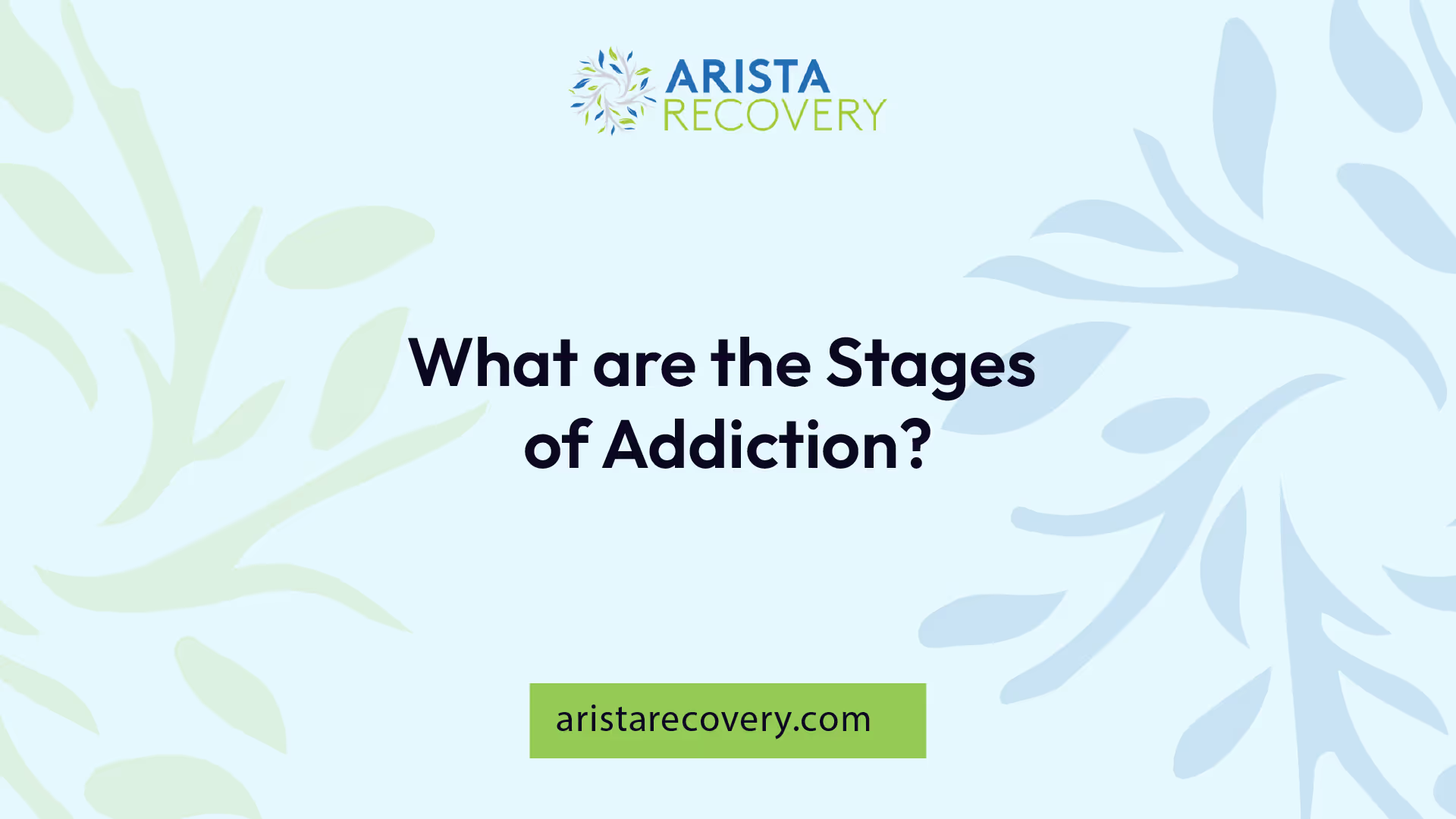What are the Stages of Addiction?


Understanding Addiction
Addiction is a complex condition that unfolds over time through various stages. It begins with initial exposure to a substance and can progress through different phases leading to dependence. This section covers the first two stages: initiation and experimentation, followed by risky use and dependence.
Initiation and Experimentation
The first stage of addiction is initiation, where individuals try a substance for the first time, usually before the age of 18. This initiation often occurs due to factors such as curiosity, peer pressure, or the desire to fit in [1].
Following initiation is the experimentation stage. At this point, users move beyond simply trying the drug to using it in varied contexts. They may seek pleasure or use substances as a means of stress management. In this stage, individuals typically make conscious choices regarding their substance use, with little to no cravings for the substance.
StageDescriptionInitiationFirst-time use, often influenced by curiosity or peer pressure.ExperimentationUsing the substance in different contexts, focused on enjoyment.
Risky Use and Dependence
As the individual progresses, they may enter the risky use stage. This fourth stage indicates that regular substance use begins to negatively impact different areas of their life. Individuals may find themselves facing legal issues, such as DUIs, experiencing a decline in work or school performance, and encountering financial difficulties.
The fifth stage, dependence, emerges when the individual starts to rely on the substance for normal functioning. This dependency can be physical, psychological, or both. At this stage, withdrawal symptoms may occur when the substance is not used, leading to a compelling perception that the drug is necessary to cope with daily life [1].
StageDescriptionRisky UseRegular use causing negative effects on life and responsibilities.DependenceReliance on substance leading to withdrawal symptoms and functionality issues.
Progression of Addiction
Understanding the progression of addiction is crucial for recognizing how substance use transforms individuals over time. This process involves significant behavioral changes as well as a range of physical and psychological effects.
Addiction and Behavioral Changes
As individuals advance through the stages of addiction, their behaviors often shift in response to their substance use. The journey begins with initiation, where a person tries a substance, typically before the age of 18, driven by curiosity or peer pressure.
In the later stages, particularly during risky use and dependence, behavioral changes become more pronounced.
StageBehavioral ChangesInitiationFirst-time experimentation with a substance.Risky UseRegular use begins to disrupt daily life. Issues arise such as DUIs and workplace or academic decline [1].DependenceReliance on the substance to function, leading to a perception that normalcy depends on its use [1].
These changes can lead to patterns of behavior that prioritize substance use over responsibilities, relationships, and overall well-being.
Physical and Psychological Effects
The physical and psychological impacts of addiction can be profound. Users may experience a range of symptoms, both acute and chronic, influenced by the substance of choice.
Physically, dependence can lead to withdrawal symptoms when the substance is not available, which can manifest as nausea, tremors, or intense cravings. Psychologically, addiction can foster conditions such as anxiety, depression, or other mental health disorders.
Effect TypePhysical EffectsPsychological EffectsAcuteWithdrawal symptoms, increased toleranceAnxiety, mood swingsChronicHealth complications, organ damageDepression, cognitive decline
The transformation seen in individuals moving through the stages of addiction highlights the importance of understanding these dynamics for effective intervention and support. Recognizing the indicators of behavioral and physiological change can be vital for those seeking help or looking to support others on their journey towards recovery.
Mental Health and Addiction
Understanding the relationship between mental health and addiction is crucial for comprehending the stages of addiction. Individuals struggling with substance use disorder often face co-occurring mental health disorders, which significantly influence their journey of addiction and recovery.
Co-Occurring Disorders
Co-occurring disorders refer to the presence of both substance use disorders and mental health disorders in an individual. Mental disorders like anxiety, depression, or schizophrenia can manifest before the onset of addiction, or, conversely, drug use may trigger or worsen these mental health conditions [2].
The complexities of diagnosing co-occurring disorders arise from the overlapping symptoms of addiction and mental health issues. For example, addiction is associated with symptoms of anxiety and depression, creating a two-way street relationship that complicates the recovery process. Withdrawal symptoms can often resemble those of depression, making it challenging to identify the underlying conditions.
Mental Health DisorderPrevalence in Substance Use Disorder PatientsAnxiety Disorders20% - 30%Major Depressive Disorder20% - 30%Schizophrenia1% - 2%
Relationship with Substance Use
The relationship between mental health and substance use is multifaceted. Many individuals turn to substances to cope with underlying mental health issues, while others may find that their substance misuse exacerbates existing conditions. This cyclical nature highlights the importance of simultaneous treatment for both addiction and mental health conditions.
In 2015, an estimated 47.7 million Americans used illicit drugs or misused prescription medication, and about 66.7 million engaged in binge drinking [3]. Around 20 million individuals were affected by substance use disorders, demonstrating the significant overlap between substance misuse and mental health disorders [3].
Addressing both mental health and substance use disorders is critical for effective treatment. Coordinated care and therapy can provide individuals with the tools and support needed to navigate their recovery journey.
Impacts of Substance Abuse
Substance abuse has far-reaching consequences that affect not only the individual struggling with addiction but also their loved ones and society as a whole. This section explores the health complications associated with substance misuse and the risk factors for illnesses that arise from addiction.
Health Complications
Substance abuse can lead to a range of serious health problems which can be devastating not only to the individual but also to those around them. Some of the significant health consequences include:
The following table summarizes some of the health complications associated with substance abuse:
Health ComplicationsExamplesCardiovascular IssuesHeart disease, StrokeRespiratory ProblemsLung diseaseCancerLung, Liver, etc.Mental Health DisordersDepression, AnxietyDental Issues"Meth mouth"Overdose RisksFatalities from opioids
Risk Factors for Illnesses
Individuals struggling with substance misuse are at a heightened risk for various illnesses that can further undermine their health. These risks can be biological, psychological, or social in nature. Some common factors include:
The following table illustrates risk factors associated with substance-related illnesses:
Risk Factors for IllnessesDescriptionGenetic FactorsFamily history of substance abuseMental Health IssuesConcurrent psychological conditionsEnvironmental InfluencesHigh-stress or high-exposure environmentsSocial DynamicsPeer pressure and social acceptance of drug use
Understanding the health complications and risk factors linked to substance abuse is essential for effective prevention and intervention strategies. While many factors contribute to addiction, awareness can guide individuals and communities towards healthier choices and better support systems.
Treatment for Substance Use Disorder
Treatment for Substance Use Disorder (SUD) is crucial for those in recovery. It aims to address dual challenges: addiction and any co-existing mental health conditions. Understanding the components of effective treatment can guide individuals as they seek help on their journey to recovery.
Addressing Mental Health Needs
Drug use and mental illnesses often co-exist, creating complex challenges for treatment. Disorders such as anxiety, depression, or schizophrenia may manifest before addiction or can be triggered by substance use, particularly in individuals with specific vulnerabilities. Treatment should not only target addiction but also address these mental health issues simultaneously.
Effective treatment programs emphasize the importance of understanding each patient's unique situation, leading to better outcomes. Integrated treatment models that focus on both substance use and mental health can significantly enhance recovery prospects, helping individuals develop healthier coping mechanisms.
Components of Effective Treatment
Successful treatment for SUD should encompass various elements to meet the individual's mental and physical health needs. This approach can help individuals rebuild a productive life and foster positive relationships with family, work, and society. The main components of effective treatment may include:
ComponentDescriptionBehavioral TherapyHelps individuals identify and change unhealthy thought patterns and behaviors.Group TherapyProvides peer support and shared experiences to foster community and reduce feelings of isolation.MedicationUtilizes pharmacological aids to alleviate withdrawal symptoms and cravings.
According to Medical News Today, nearly 20 million individuals in the U.S. experienced SUD in 2015 alone. Despite the prevalence, only 10.4% of individuals with a substance use disorder seek treatment, and only about a third of those receiving care find it to be adequate [3].
Addressing the multifaceted aspects of addiction through these effective treatment components is essential for guiding individuals toward recovery and developing a healthier relationship with substances.
Public Health and Substance Misuse
Understanding the public health implications of substance misuse is crucial for addressing the challenges of addiction. This section delves into the prevalence of substance use disorders and the need for improvements in healthcare systems.
Prevalence and Treatment Stats
Substance use disorders are medical illnesses that impact over 20 million individuals in the United States, with the most severe cases being classified as addictions [3]. Despite the significant number of cases, only about 10.4% of individuals with these disorders receive treatment, with even fewer receiving the appropriate level of care as per established standards. This stark discrepancy underscores the critical need for better access and quality in treatment services.
The following table summarizes key statistics related to substance misuse in the U.S.:
StatisticNumberTotal individuals with disorders20 millionIndividuals receiving treatment10.4%Americans misusing drugs/alcohol47.7 millionEngaging in binge drinking66.7 millionDriving under the influence27.9 million
Data indicates that substance misuse includes various harmful behaviors related to substance use, highlighting the complexity of addressing this public health crisis. Continuous research has explored the biological, psychological, and social aspects of these issues, guiding the development of effective prevention and treatment strategies.
Improving Health Care Systems
The gap in treatment underscores the need for improvements within healthcare systems to ensure that those affected by substance use disorders receive the care they require. This includes enhancing access to quality treatment options that adhere to necessary standards.
Efforts to improve healthcare systems involve increasing funding for addiction services, expanding insurance coverage for treatment, and enhancing education and training for healthcare providers. Research has shown that incorporating evidence-based practices in treatment approaches can lead to better outcomes for individuals struggling with addiction.
Addressing the public health crisis of substance misuse requires a multi-faceted approach that includes prevention, early intervention, and comprehensive treatment options. By focusing on these areas, healthcare systems can effectively combat the rising prevalence of substance use disorders and support the recovery of affected individuals.
References
[2]:
[3]:
[4]:
You’re not alone in this.
When mental health challenges and addiction intersect, it can feel isolating. At Arista, we offer compassionate, evidence-based, and trauma-informed care to help you heal, grow, and move forward.
You’re not alone in this.
When mental health challenges and addiction intersect, it can feel isolating. At Arista, we offer compassionate, evidence-based, and trauma-informed care to help you heal, grow, and move forward.
Support that moves with you.
You’ve taken a brave first step. At Arista Recovery, we’re here to help you continue with best-in-class care designed for long-term healing and support.
.webp)






